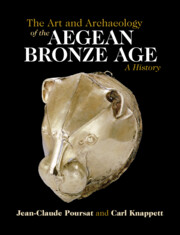Book contents
- The Art and Archaeology of the Aegean Bronze Age
- The Art and Archaeology of the Aegean Bronze Age
- Copyright page
- Contents
- Figures
- Introduction
- Part I Aegean Neolithic Art
- Part II The Art of the Aegean Early Bronze Age
- Part III Aegean Art in the Cretan First Palace Period
- Part IV Aegean Art in the Second Palace Period
- Part V Aegean Art in the Cretan Second Palace Period
- Part VI Aegean Art in the Final Palatial Period of Knossos
- Part VII Aegean Art of the Mainland Mycenaean Palatial Period
- Chapter 41 Artworks in Context
- Chapter 42 Architecture
- Chapter 43 Mycenaean Painting
- Chapter 44 The End of Aegean Glyptic
- Chapter 45 Mycenaean Ivories of LH IIIA2–B
- Chapter 46 Other Relief Arts
- Chapter 47 Mycenaean Art and ‘International Art’
- Chapter 48 Artworks in the Round
- Chapter 49 Pottery Production
- Part VIII Aegean Art at the End of the Bronze Age
- Afterword Aegean Art Through Forgers’ Eyes
- References
- Index
- Plate Section (PDF Only)
- References
Chapter 44 - The End of Aegean Glyptic
from Part VII - Aegean Art of the Mainland Mycenaean Palatial Period
Published online by Cambridge University Press: 19 May 2022
- The Art and Archaeology of the Aegean Bronze Age
- The Art and Archaeology of the Aegean Bronze Age
- Copyright page
- Contents
- Figures
- Introduction
- Part I Aegean Neolithic Art
- Part II The Art of the Aegean Early Bronze Age
- Part III Aegean Art in the Cretan First Palace Period
- Part IV Aegean Art in the Second Palace Period
- Part V Aegean Art in the Cretan Second Palace Period
- Part VI Aegean Art in the Final Palatial Period of Knossos
- Part VII Aegean Art of the Mainland Mycenaean Palatial Period
- Chapter 41 Artworks in Context
- Chapter 42 Architecture
- Chapter 43 Mycenaean Painting
- Chapter 44 The End of Aegean Glyptic
- Chapter 45 Mycenaean Ivories of LH IIIA2–B
- Chapter 46 Other Relief Arts
- Chapter 47 Mycenaean Art and ‘International Art’
- Chapter 48 Artworks in the Round
- Chapter 49 Pottery Production
- Part VIII Aegean Art at the End of the Bronze Age
- Afterword Aegean Art Through Forgers’ Eyes
- References
- Index
- Plate Section (PDF Only)
- References
Summary
It is paradoxically at the height of the Mycenaean palaces that glyptic art loses its status as the principal form of relief art. The making of gold signet rings, whether on Crete or the mainland, ceases around the moment when the palace of Knossos is destroyed in 1370 bc; that of hard semi-precious sealstones stops shortly after, and does not go beyond the end of Late Helladic (LH) IIIA (J.-C. Poursat, in Driessen and Farnoux 1997, 387–90). No stylistic evolution can be discerned on seals discovered in later contexts.
Admittedly, palatial administrations still use sealing systems to manage what goods come in and out. At Knossos, the latest of its archival documents could date to c.1300 bc; subsequently, only a few sealings on jars exist (Krzyszkowska 2005, 216–17, 223–31).
- Type
- Chapter
- Information
- The Art and Archaeology of the Aegean Bronze AgeA History, pp. 432 - 436Publisher: Cambridge University PressPrint publication year: 2022

